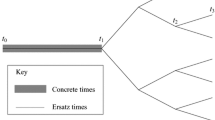Abstract
The Kalām cosmological argument deploys the following causal principle: whatever begins to exist has a cause. Yet, under what conditions does something ‘begin to exist’? What does it mean to say that ‘X begins to exist at t’? William Lane Craig has offered and defended various accounts that seek to establish the necessary and sufficient conditions for when something ‘begins to exist.’ I argue that all of the accounts that William Lane Craig has offered fail on the following grounds: either they entail that God has a cause or they render the Kalām argument unsound. Part of the problem is due to Craig’s view of God’s relationship to time: that God exists timelessly without creation and temporarily with creation. The conclusion is that Craig must abandon either the Kalām argument or his view of God’s relationship to time; he cannot consistently hold both.
Similar content being viewed by others
Notes
Hereafter, I shall also assume the A-theory of time since both the KA and CGT are committed to its truthfulness.
I should note that Craig (see Craig 2002b, 98) and one of the reviewers disagree with my intuitions regarding BTE1. They agree that there is nothing deeply problematic about the intuition that someone can ‘begin to exist’ at multiple times. Fortunately for me, this disagreement of intuitions does not salvage BTE1. Both the BTE1 and BTE2 fail for the same reason: they entail that God has a cause. If you favor the intuitions behind BTE1, then note that the objection against BTE2 works just as effectively against BTE1.
The distinction between ‘logically impossible’ and ‘metaphysically impossible’ is contentious in contemporary metaphysics; after all, what counts as ‘metaphysically possible’ and ‘metaphysically impossible’? How is that different from logical possibility and impossibility? I assume that there is a viable distinction here.
See Ted Sider, Four Dimensionalism (Oxford: Oxford University Press, 2001) for a view of time along these lines.
A referee pointed out that Craig could try to argue that no physical object such as my basketball could exist timelessly. Perhaps he could argue as follows: Physical objects qua physical are essentially subject to the laws of physics. Physical objects that are subject to the laws of physics are, of necessity, in time. Therefore, my basketball cannot exist timelessly. This argument will not work, for it is unclear why physical objects subject to the laws of nature are, of necessity, in time. Is it because the laws of physics, of necessity, bring about change in objects? But why think that? It certainly seems possible that God could uphold my basketball in existence in such a way that my basketball never changes. Moreover, this response does not address the state of affairs (2) since it is unclear whether or not the universe is a physical object. Is the universe as a whole subject to the laws of physics?
A referee asks, what if we replace (iii) with (iii*): x does not exist timelessly in the actual world? Wouldn’t this avoid the objections regarding the ambiguity of a state of affair’s timeless existence? Response: We would need an account of what it means for x to ‘exist timelessly’ and what is meant by ‘the actual world.’ If ‘the actual world’ means our temporal universe, then God does satisfy (iii*) since he would always exist in time. But, what other way are we to understand ‘the actual world’? Moreover, at no time does God exist timelessly. So, how are we to understand ‘exist timelessly’?
References
Craig, W. L. (2001a). Time and eternity: Exploring God’s relationship to time. Wheaton: Crossway Books.
Craig, W. L. (2001b). ‘God and the beginning of time.’. International Philosophical Quarterly, 41(1), 17–31.
Craig, W. L. (2002a). ‘The Kalām cosmological argument.’. In W. L. Craig (Ed.), Philosophy of religion: A reader and guide (pp. 92–113). New Brunswick: Rutgers University Press.
Craig, W. L. (2002b). ‘Must the beginning of the universe have a personal cause? A rejoinder’. Faith and Philosophy, 19(2), 94–105.
Craig, W.L. (2003). ‘Beginning to Exist.’ Reasonable Faith with William Lane Craig. http://www.reasonablefaith.org/beginning-to-exist. Accessed 10 July, 2012.
Craig, W. L., & Copan, P. (2004). Creation out of nothing: A biblical, philosophical and scientific exploration. Grand Rapids: Baker Academic.
Morriston, W. (2000). Must the beginning of the universe have a personal cause? A critical examination of the Kalām cosmological argument. Faith and Philosophy, 17(2), 149–169.
Author information
Authors and Affiliations
Corresponding author
Rights and permissions
About this article
Cite this article
Bobier, C.A. God, Time and the Kalām Cosmological Argument. SOPHIA 52, 593–600 (2013). https://doi.org/10.1007/s11841-013-0362-4
Published:
Issue Date:
DOI: https://doi.org/10.1007/s11841-013-0362-4



